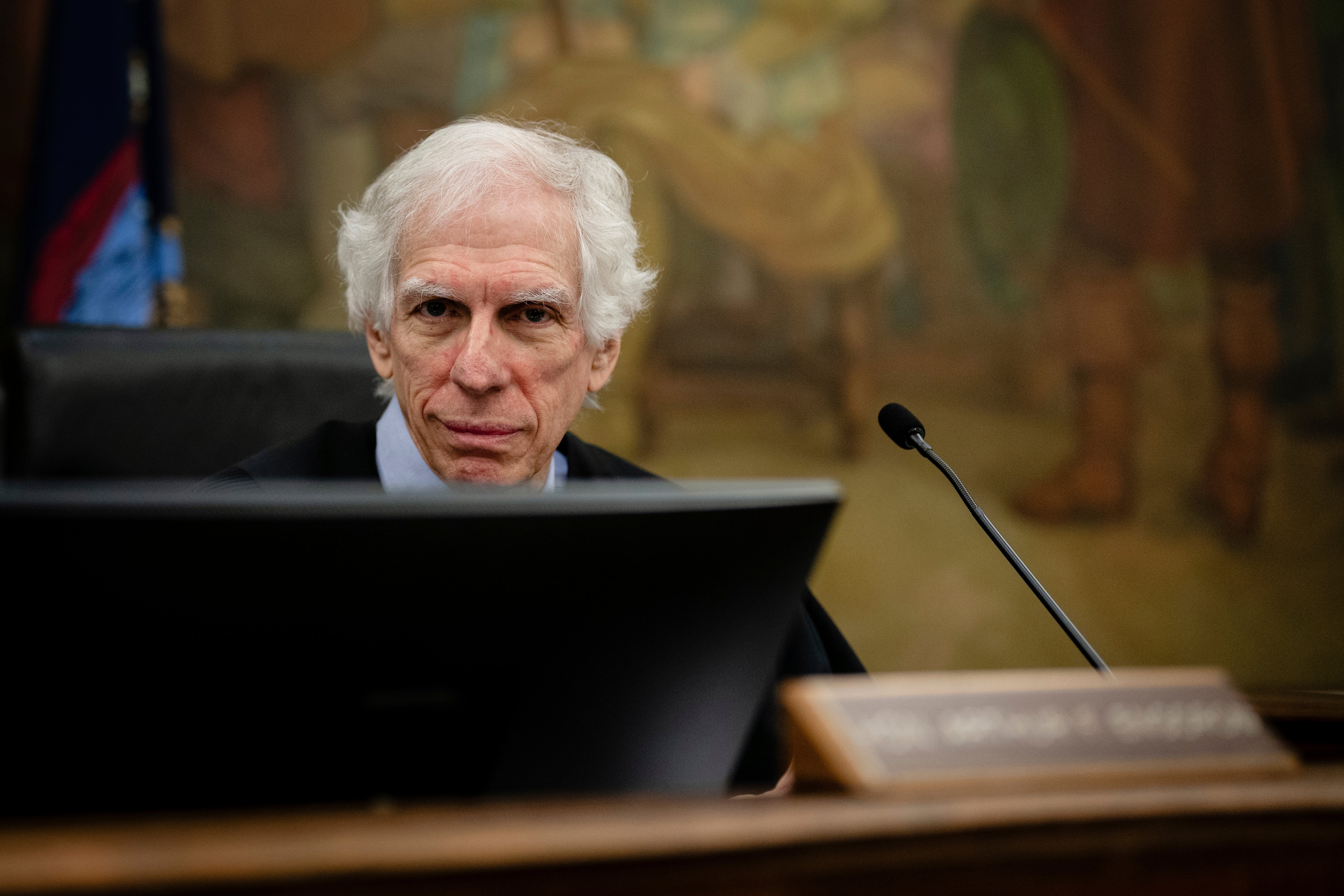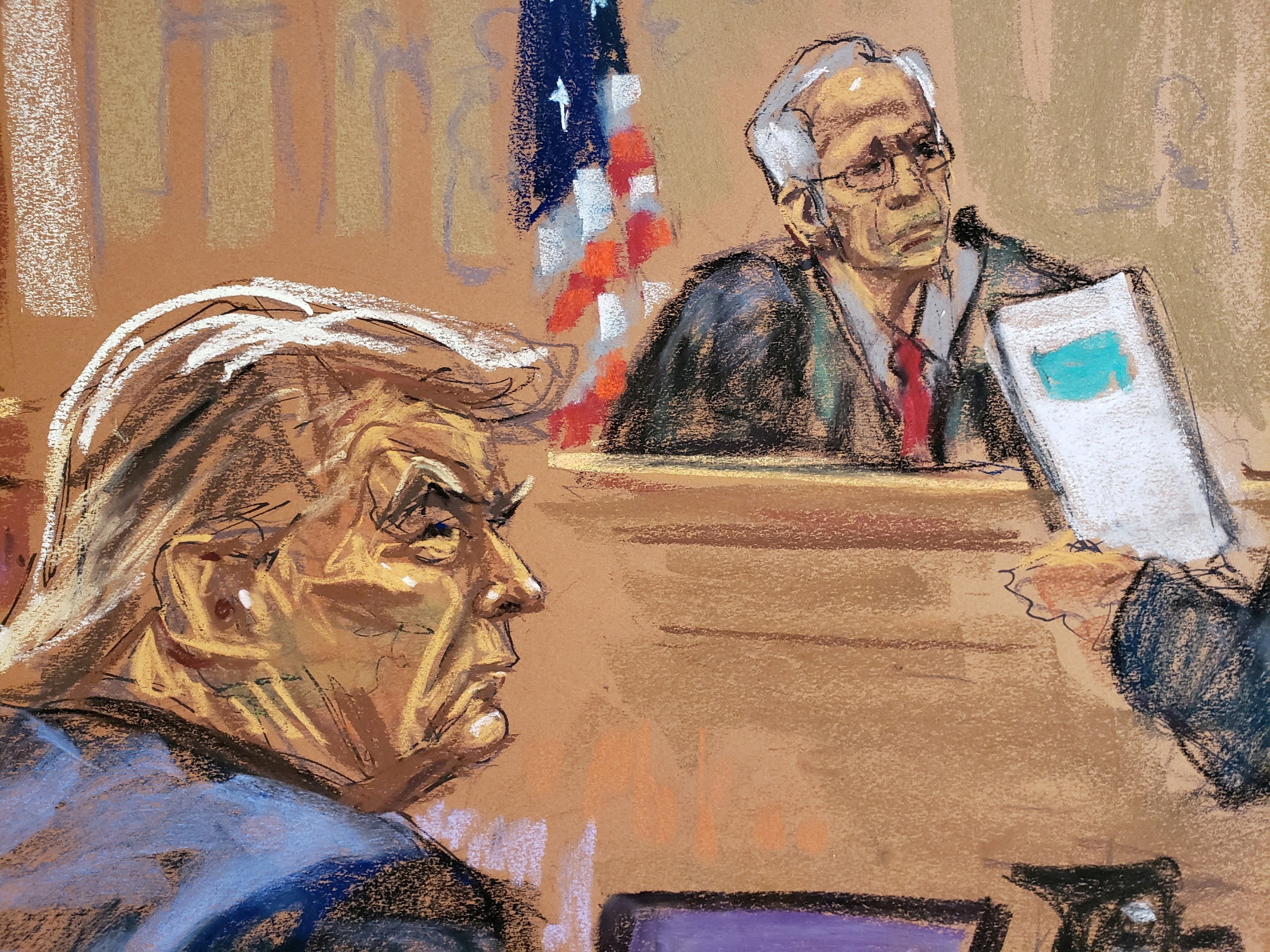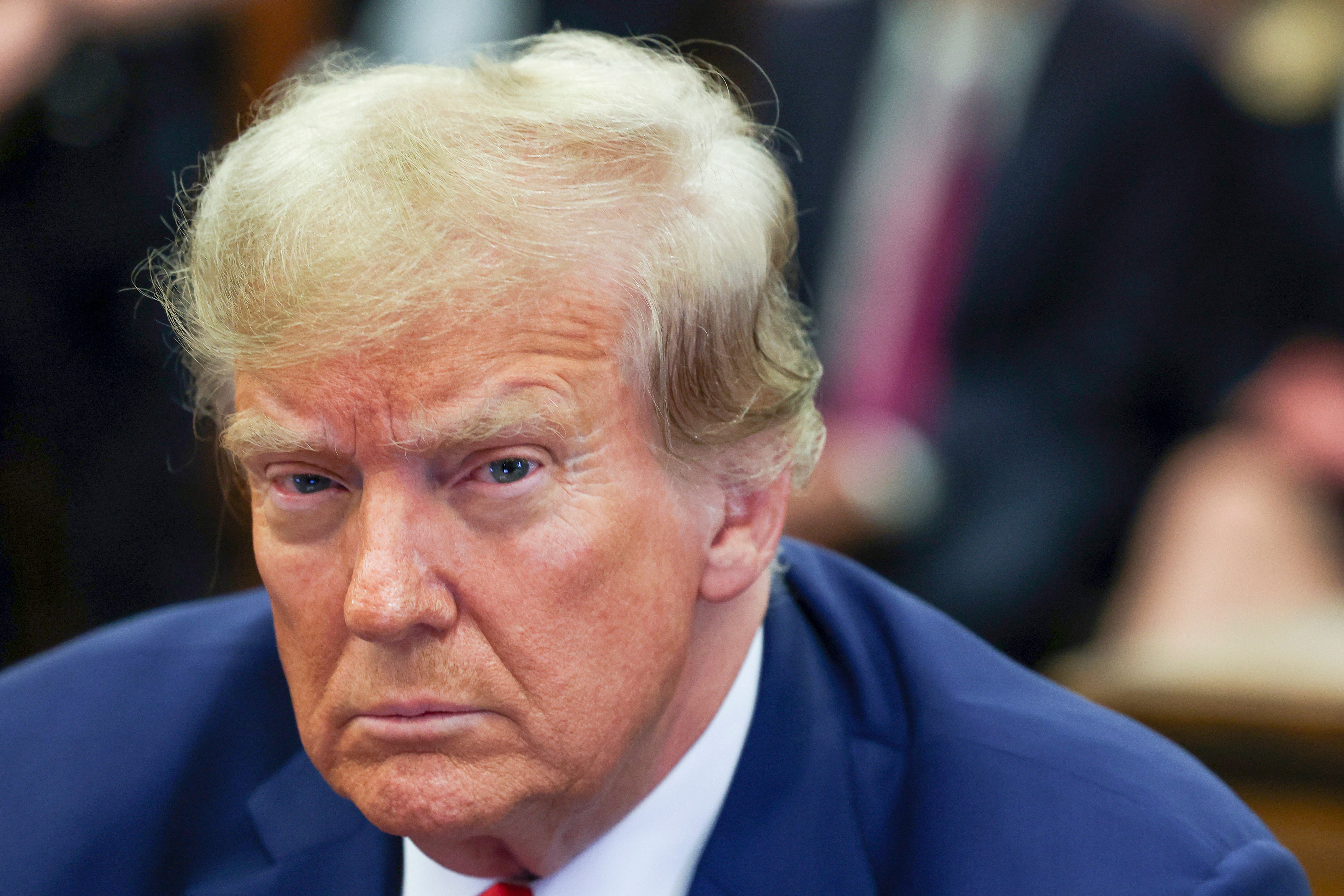Judge orders Donald Trump to pay more than $350m in massive fraud trial ruling
The former president is barred from New York business for three years in a verdict that threatens to wipe out his cash and imperil his real estate empire
Donald Trump, his adult sons and their chief associates in the Trump Organization’s sprawling real-estate empire have been ordered to pay more than $364m after a months-long case targeting fraud in the family business.
The former president and his co-defendants defrauded banks and investors as part of a decade-long scheme to secure favourable financing terms for some of his brand-building properties, according to a blockbuster lawsuit filed by New York’s attorney general nearly two years ago.
A final judgment from New York Justice Arthur Engoron on Friday finds the former president, Donald Trump Jr and Eric Trump, as well as their Trump Organization associates and Trump properties liable for tens of millions of dollars.
Mr Trump, his companies and his trust must pay the state more than $354m. His sons are each ordered to pay roughly $4m.
The former president also is barred from holding any executive office with a New York company and from getting loans from New York banks for three years. His adult sons are barred from executive offices with any New York company for two years.
Former executives Allen Weisselberg and Jeffrey McConney are also permanently barred from financially controlling any New York businesses, and face a three-year ban from serving as an officer or director of any New York business.
The judge’s final ruling in the case struck at the defendants’ lack of credibility on the witness stand, their failed strategy to “blame the accountants” for the false financial statements and valuations at the centre of the case, and the “evidence of deceit” used to come up with the inflated figures under scrutiny.
He pointed to a history of malfeasance within the Trump Organization, followed by the findings in the sprawling fraud case, to determine that Mr Trump and his co-defendants are “likely to continue their fraudulent ways unless the Court grants significant injunctive relief.
“Their complete lack of contrition and remorse borders on pathological,” he wrote in a 92-page order on Friday.
“They are accused only of inflating asset values to make more money. The documents prove this over and over again. This is a venial sin, not a mortal sin,” he added. “Defendants did not commit murder or arson. They did not rob a bank at gunpoint. Donald Trump is not Bernard Madoff. Yet, defendants are incapable of admitting the error of their ways.”

After 11 weeks of witness testimony followed by closing arguments last month, the judge overseeing the case issued a final judgment that delivered yet another blow to Mr Trump’s mounting legal challenges as he seeks the Republican nomination for president.
The judgment also comes one day after a state judge in a separate criminal case scheduled a trial on charges stemming from hush money payments to an adult film star, and less than a month after a federal jury in another civil case decided he owes more than $83m to E Jean Carroll for repeatedly defaming a woman he was found liable for sexually assaulting.
Back-to-back judgments totalling more $400m could not only evaporate Mr Trump’s cash on hand but also seriously imperil a brand on which he has built his political career.
The civil fraud trial in New York County Supreme Court offered an early glimpse of Mr Trump’s reliance on courtrooms for his campaign, which has baselessly framed his criminal charges and lawsuits as “election interference” and a conspiracy to derail his shot at the White House.
In a statement on Friday, Mr Trump called the ruling an “illegal, unAmerican judgment against me, my family, and my tremendous business.”
“This ‘decision’ is a Complete and Total SHAM,” he wrote on his Truth Social. “There were No Victims, No Damages, No Complaints.”
His attorney Alina Habba said they plan to appeal.
The attorney general touted the verdict as a “massive victory” for the state.
“When powerful people cheat to get better loans, it comes at the expense of hardworking people,” she said in a statement. “Everyday Americans cannot lie to a bank to get a mortgage, and if they did, our government would throw the book at them. There simply cannot be different rules for different people.”

Mr Trump used the hallway outside the courtroom in lower Manhattan to attack his political rivals and the prosecutors and judges overseeing the multiple cases against him. Mr Trump and his attorneys repeatedly defied courtroom instructions and gag orders that they blasted as politically motivated and illegal, while death threats poured into the courthouse after the former president’s repeat attacks against the judge and his staff.
A lawsuit from New York Attorney General Letitia James, filed in September 2022, accuses Mr Trump and his co-defendants of grossly inflating his net worth and assets in documents handed to banks and lenders as proof of his financial state to secure more favourable financing terms for some of his star properties.
Judge Engoron issued a damning pretrial judgment one year later, finding that the defendants are liable for allegations of fraud, and leaving a bench trial to determine how much Mr Trump and his associates should owe, if anything, and whether the attorney general is successful on arguments for other claims in her complaint.
The attorney general’s office initially sought $250m from the defendants.
But after testimony in taped depositions and in courtroom arguments, her office instead pushed for $370m in sanctions for so-called “ill-gotten gains” the defendants received as a result of fraudulently obtained financing terms that banks would have received if they used rates that reflected Mr Trump’s actual net worth and assets, according to the attorney general’s office.
Her office also asked the judge to ban Mr Trump and his former chief associates Allen Weisselberg and Jeffrey McConney from the state’s real estate industry for life.
His sons Donald Trump Jr and Eric Trump – who effectively took control of the Trump Organization’s day-to-day business and Mr Trump’s trust when he was in the White House – also faced five-year bans from the industry, under Ms James’s proposed sanctions.
The latest multi-million dollar judgments add to Mr Trump’s growing list of legal liabilities, spanning several lawsuits and 91 criminal charges stemming from four separate federal and state-level charges, including for alleged crimes committed while in office.
He has pleaded not guilty in all cases.
In furious arguments to the judge throughout the fraud trial, defence attorneys repeatedly stated that the banks were satisfied and that the claims in the attorney general’s lawsuit were based on speculation, with Ms James – typically seated in a row just behind lawyers with her office – routinely accused of waging a politically motivated stunt to defeat Mr Trump’s political ambitions.
They repeatedly used terms that Mr Trump has used to attack the case and his rivals, labelling the potential sanctions against him the “corporate death penalty” and an example of “weaponised” law enforcement.
“These are success stories,” said Mr Kise, referencing Mr Trump’s brand-building properties targeted by the attorney general’s office. “Rather than praising Trump for his business success” they are attacking him for a “victimless” offence, he said. “It’s insane.”
He claimed that a judgment against Mr Trump and his co-defendants would deal a major blow to all New York business, not just Mr Trump’s.
“This is an extremely dangerous path,” he said. “Weaponization … I know that gets tossed around a lot but that’s really what this is.”

Mr Trump’s annual statements of financial condition – documents provided to lenders to reflect Mr Trump’s financial state as he sought the banks’ backing – have been at the heart of the case.
Those statements were false “for every year” they were issued since 2011, state attorney Kevin Wallace said in closing arguments last month.
“If you look at it across time, it becomes clear that fraud was central to the operation of the Trump Organization’s business,” Mr Wallace said.
The trial then set out to determine “what did the defendants know, and when did they know it,” and showed that “each individual defendant was acting knowingly and intentionally,” he added.
In their closing remarks, state attorneys also laid out for the first time what they believe was Mr Trump’s motivation for the alleged fraud, suggesting the defendants turned to fraud while low on cash during his 2016 campaign and presidency.
That way, “they didn’t have to choose between their priorities,” Mr Wallace said.
Join our commenting forum
Join thought-provoking conversations, follow other Independent readers and see their replies
Comments
Bookmark popover
Removed from bookmarks